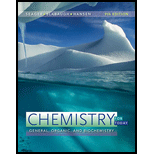
Concept explainers
(a)
Interpretation:
The pressure of
Concept introduction:
The mathematical expressions used to demonstrate the behavior of gases are known as
Answer to Problem 6.21E
The pressure of
Explanation of Solution
The relation between
The given pressure of
The pressure of
(b)
Interpretation:
The pressure of
Concept introduction:
The mathematical expressions used to demonstrate the behavior of gases are known as gas laws. These expressions are used under the several changes like temperature, pressure etc. The use of these expressions helps to understand the behavior of gases changing under a particular condition.
Answer to Problem 6.21E
The pressure of
Explanation of Solution
The relation between
The relation between
Use above two relations and calculate the given pressure in
The pressure of
(c)
Interpretation:
The pressure of
Concept introduction:
The mathematical expressions used to demonstrate the behavior of gases are known as gas laws. These expressions are used under the several changes like temperature, pressure etc. The use of these expressions helps to understand the behavior of gases changing under a particular condition.
Answer to Problem 6.21E
The pressure of
Explanation of Solution
The relation between
The relation between
Use above two relations and calculate the given pressure in
The pressure of
(d)
Interpretation:
The pressure of
Concept introduction:
The mathematical expressions used to demonstrate the behavior of gases are known as gas laws. These expressions are used under the several changes like temperature, pressure etc. The use of these expressions helps to understand the behavior of gases changing under the particular condition.
Answer to Problem 6.21E
The pressure of
Explanation of Solution
The relation between
The relation between
Use above two relations and calculate the given pressure in
The pressure of
Want to see more full solutions like this?
Chapter 6 Solutions
Chemistry for Today: General, Organic, and Biochemistry
- reaction scheme for C39H4202 Hydrogenation of Alkyne (Alkyne to Alkene) show reaction (drawing) pleasearrow_forwardGive detailed mechanism Solution with explanation needed. Don't give Ai generated solutionarrow_forwardShow work with explanation needed....don't give Ai generated solutionarrow_forward
- Chemistry: Matter and ChangeChemistryISBN:9780078746376Author:Dinah Zike, Laurel Dingrando, Nicholas Hainen, Cheryl WistromPublisher:Glencoe/McGraw-Hill School Pub Co
 Principles of Modern ChemistryChemistryISBN:9781305079113Author:David W. Oxtoby, H. Pat Gillis, Laurie J. ButlerPublisher:Cengage Learning
Principles of Modern ChemistryChemistryISBN:9781305079113Author:David W. Oxtoby, H. Pat Gillis, Laurie J. ButlerPublisher:Cengage Learning Chemistry: The Molecular ScienceChemistryISBN:9781285199047Author:John W. Moore, Conrad L. StanitskiPublisher:Cengage Learning
Chemistry: The Molecular ScienceChemistryISBN:9781285199047Author:John W. Moore, Conrad L. StanitskiPublisher:Cengage Learning  Introductory Chemistry: A FoundationChemistryISBN:9781337399425Author:Steven S. Zumdahl, Donald J. DeCostePublisher:Cengage Learning
Introductory Chemistry: A FoundationChemistryISBN:9781337399425Author:Steven S. Zumdahl, Donald J. DeCostePublisher:Cengage Learning Chemistry for Engineering StudentsChemistryISBN:9781337398909Author:Lawrence S. Brown, Tom HolmePublisher:Cengage Learning
Chemistry for Engineering StudentsChemistryISBN:9781337398909Author:Lawrence S. Brown, Tom HolmePublisher:Cengage Learning Chemistry by OpenStax (2015-05-04)ChemistryISBN:9781938168390Author:Klaus Theopold, Richard H Langley, Paul Flowers, William R. Robinson, Mark BlaserPublisher:OpenStax
Chemistry by OpenStax (2015-05-04)ChemistryISBN:9781938168390Author:Klaus Theopold, Richard H Langley, Paul Flowers, William R. Robinson, Mark BlaserPublisher:OpenStax





